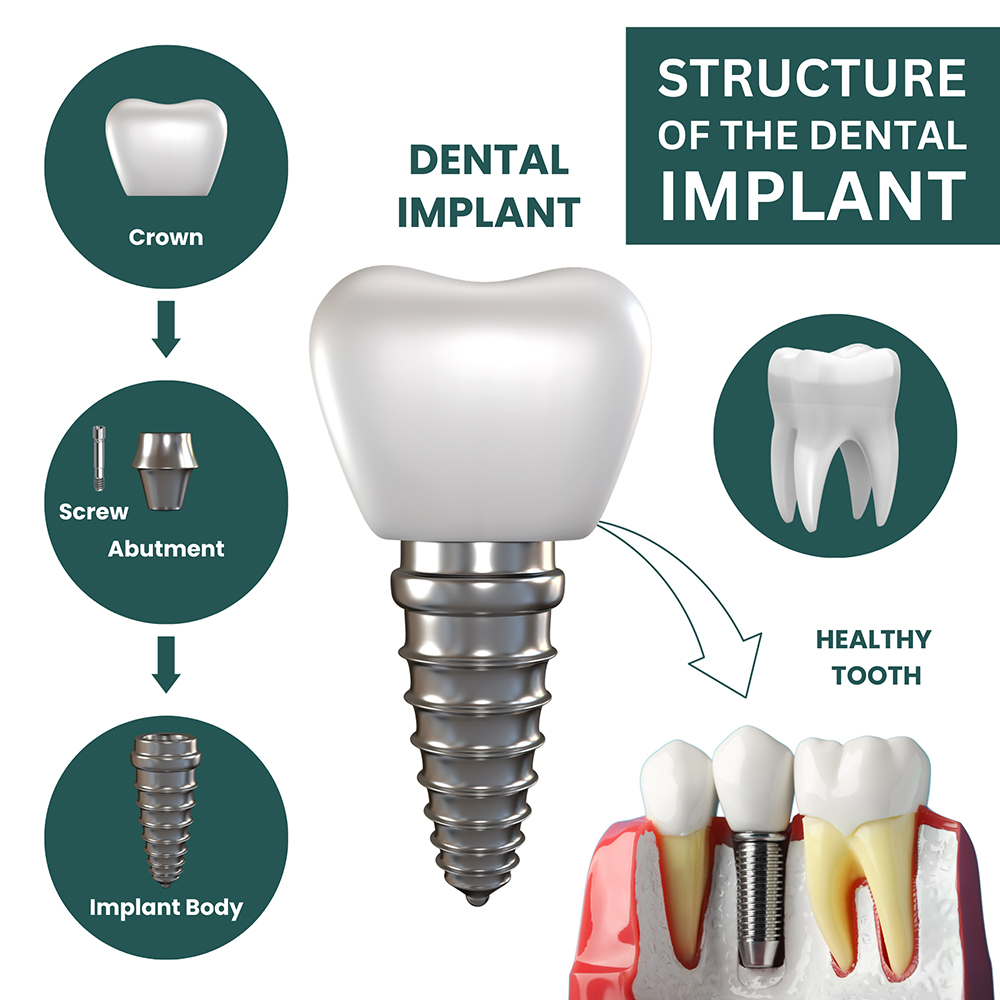Some Known Facts About Dental Sense.
Table of ContentsGetting My Dental Sense To Work4 Easy Facts About Dental Sense DescribedDental Sense Can Be Fun For AnyoneExcitement About Dental Sense
are clinical gadgets operatively dental implanted right into the jaw to bring back a person's capacity to chew or their look. They supply assistance for fabricated (phony) teeth, such as crowns, bridges, or dentures. When a tooth is lost due to injury or illness, an individual can experience problems such as quick bone loss, malfunctioning speech, or changes to chewing patterns that result in discomfort.Oral dental implant systems include an oral implant body and dental implant joint and may additionally consist of an abutment fixation screw. Same day dental implants. The oral implant body is surgically placed in the jawbone in location of the tooth's origin. The dental implant abutment is generally affixed to the implant body by the abutment fixation screw and prolongs through gums right into the mouth to support the connected man-made teeth
(https://dental-sense-48874067.hubspotpagebuilder.com/dental-sense/dental-veneers-cost-kids-dental-and-dental-implant-vs-bridge-everything-you-need-to-know)Framework of The Oral Implant System choosing oral implants, speak with your oral supplier about the possible benefits and threats, and whether you are a candidate for the treatment. Things to think about: Your total wellness is a vital variable in establishing whether you are a great prospect for dental implants, how much time it will take to heal, and for how long the implant might remain in area.
Cigarette smoking may impact the recovery procedure and decrease the long-term success of the dental implant. The recovery process for the implant body may take a number of months or longer, during which time you typically have a momentary abutment instead of the tooth. the oral implant treatment: Thoroughly adhere to the dental health directions provided to you by your dental company.
Dental Sense Fundamentals Explained
Implant failing can cause the need for one more procedure to deal with or change the implant system. Restores the capacity to eat Recovers cosmetic appearance Assists maintain the jawbone from reducing because of bone loss Protects the health of the surrounding bone and gums Helps keep nearby (nearby) teeth steady Boosts quality of life Damages to bordering natural teeth during dental implant positioning Injury to the surrounding tissues during surgery, such as sinus opening Injury throughout surgery (for instance, crack of surrounding jawbone) Poor feature, such as really feeling like the teeth do not bite together typically A sensation that the tooth is loosened or twisting in position resulting from a joint screw loosening up Implant body failing (looseness of the implant body) because of systemic infection, which might be most likely in people with uncontrolled diabetes mellitus due to neighborhood infection in bone and gums supporting the implant body as home a result of delayed recovery, which may be more most likely in patients who smoke Difficulty cleaning the gums around the dental implant, resulting in bad oral hygiene Unattended periodontal condition Post-surgical numbness because of nerve impingement or damage Constantly notify healthcare companies and imaging specialists that you have oral implants prior to any magnetic resonance imaging (MRI) or x-ray procedures.
FDA is not knowledgeable about any unfavorable events reported for MRI or x-ray treatments with oral implants. Oral implants systems are usually made of materials that adhere to international agreement criteria of the International Organization for Standardization (ISO) or ASTM International. These requirements have information of what makes a risk-free material.

An oral implant is a structure that changes a missing out on tooth. With screw-like gadgets, the surgeon inserts a dental implant right into the jawbone, and it acts as an anchor for a synthetic tooth, called a crown.
The 9-Second Trick For Dental Sense
Some individuals are not eligible for dental implant surgical procedure. It is for oral specialists to operate individuals with: acute illnessuncontrollable metabolic diseasebone or soft tissue disease or infectionIf these concerns are settled, an individual can have the surgical treatment. In, oral specialists refrain from running on individuals with: If individuals with any of the above undertake oral implant surgical treatment, there is a greater threat of the implant stopping working.

Dental dental implant surgery is a personalized procedure. It's not the exact same for everybody. However the following provides a basic overview of what you can expect your dental practitioner, oral doctor, periodontist or prosthodontist to do: Place the dental implant surgically. Give you time to recover. Connect the post and final crown, bridge or denture.
Next, your cosmetic surgeon will meticulously put the oral implant into your jaw. Lastly, your surgeon will rearrange your gum tissues and shut the laceration with stitches. If your dental implant is near the front of your mouth, your dental professional will certainly make a temporary tooth for you to put on till you recover. That way, you won't have a gap in your smile while you recoup.
More About Dental Sense
Your company can tell you what to expect in your situation. During the recovery stage, your jawbone needs to fuse to the oral implant. This procedure, called osseointegration, is critical for stability and lasting success. This procedure can take anywhere from three to 9 months. Sometimes, it may take much longer.
When your implant heals, your dentist can affix the abutment (small connector post) and your last repair (crown, bridge or denture). This normally takes concerning one hour to finish and may need a second small surgical treatment. You should not feel any pain during your oral implant procedure because your supplier will use medication to numb your gum tissues.